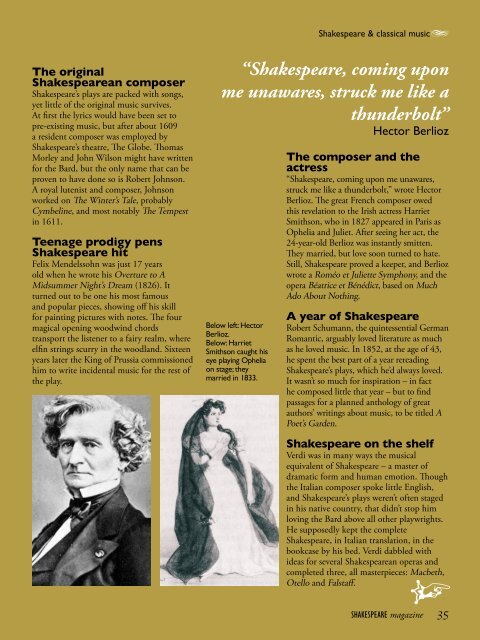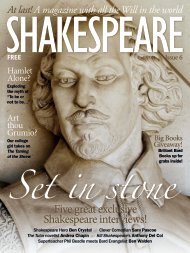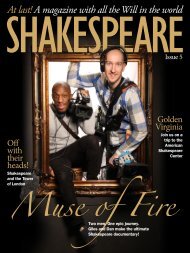Shakespeare Magazine 02
The second issue of Shakespeare Magazine features a wealth of wonders from the world of William Shakespeare. Highlights include David Tennant fans sharing their Shakespeare, Hamlet restaged with toys, Shakespeare in Sydney, and the enduring romance of Shakespeare and classical music. Plus much more!
The second issue of Shakespeare Magazine features a wealth of wonders from the world of William Shakespeare. Highlights include David Tennant fans sharing their Shakespeare, Hamlet restaged with toys, Shakespeare in Sydney, and the enduring romance of Shakespeare and classical music. Plus much more!
Create successful ePaper yourself
Turn your PDF publications into a flip-book with our unique Google optimized e-Paper software.
<strong>Shakespeare</strong> & classical music <br />
<br />
The original<br />
<strong>Shakespeare</strong>an composer<br />
<strong>Shakespeare</strong>’s plays are packed with songs,<br />
yet little of the original music survives.<br />
At first the lyrics would have been set to<br />
pre-existing music, but after about 1609<br />
a resident composer was employed by<br />
<strong>Shakespeare</strong>’s theatre, The Globe. Thomas<br />
Morley and John Wilson might have written<br />
for the Bard, but the only name that can be<br />
proven to have done so is Robert Johnson.<br />
A royal lutenist and composer, Johnson<br />
worked on The Winter’s Tale, probably<br />
Cymbeline, and most notably The Tempest<br />
in 1611.<br />
Teenage prodigy pens<br />
<strong>Shakespeare</strong> hit<br />
Felix Mendelssohn was just 17 years<br />
old when he wrote his Overture to A<br />
Midsummer Night’s Dream (1826). It<br />
turned out to be one his most famous<br />
and popular pieces, showing off his skill<br />
for painting pictures with notes. The four<br />
magical opening woodwind chords<br />
transport the listener to a fairy realm, where<br />
elfin strings scurry in the woodland. Sixteen<br />
years later the King of Prussia commissioned<br />
him to write incidental music for the rest of<br />
the play.<br />
“<strong>Shakespeare</strong>, coming upon<br />
me unawares, struck me like a<br />
thunderbolt”<br />
Hector Berlioz<br />
Below left: Hector<br />
Berlioz.<br />
Below: Harriet<br />
Smithson caught his<br />
eye playing Ophelia<br />
on stage; they<br />
married in 1833.<br />
The composer and the<br />
actress<br />
“<strong>Shakespeare</strong>, coming upon me unawares,<br />
struck me like a thunderbolt,” wrote Hector<br />
Berlioz. The great French composer owed<br />
this revelation to the Irish actress Harriet<br />
Smithson, who in 1827 appeared in Paris as<br />
Ophelia and Juliet. After seeing her act, the<br />
24-year-old Berlioz was instantly smitten.<br />
They married, but love soon turned to hate.<br />
Still, <strong>Shakespeare</strong> proved a keeper, and Berlioz<br />
wrote a Roméo et Juliette Symphony, and the<br />
opera Béatrice et Bénédict, based on Much<br />
Ado About Nothing.<br />
A year of <strong>Shakespeare</strong><br />
Robert Schumann, the quintessential German<br />
Romantic, arguably loved literature as much<br />
as he loved music. In 1852, at the age of 43,<br />
he spent the best part of a year rereading<br />
<strong>Shakespeare</strong>’s plays, which he’d always loved.<br />
It wasn’t so much for inspiration – in fact<br />
he composed little that year – but to find<br />
passages for a planned anthology of great<br />
authors’ writings about music, to be titled A<br />
Poet’s Garden.<br />
<strong>Shakespeare</strong> on the shelf<br />
Verdi was in many ways the musical<br />
equivalent of <strong>Shakespeare</strong> – a master of<br />
dramatic form and human emotion. Though<br />
the Italian composer spoke little English,<br />
and <strong>Shakespeare</strong>’s plays weren’t often staged<br />
in his native country, that didn’t stop him<br />
loving the Bard above all other playwrights.<br />
He supposedly kept the complete<br />
<strong>Shakespeare</strong>, in Italian translation, in the<br />
bookcase by his bed. Verdi dabbled with<br />
ideas for several <strong>Shakespeare</strong>an operas and<br />
completed three, all masterpieces: Macbeth,<br />
Otello and Falstaff.<br />
SHAKESPEARE magazine 35

















